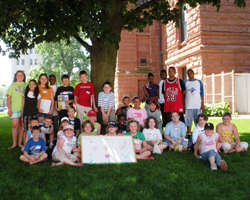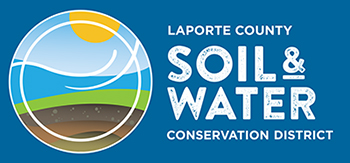It doesn’t matter if you live on a farm, in the city, or in the suburbs, conservation is everyone’s business. If you live on a farm, you might be interested in some of the Conservation Programs offered through the Natural Resources Conservation Service. These agricultural best management practices will allow you to utilize your soil and water resources in the best ways possible. Please see the list of Indiana Conservation Programs for highlights. You may also contact the NRCS District Conservationist, Theresa Wojkovich, at 219-326-6808, ext. 2116 to see if your lands are eligible for any programs. You may also be interested in irrigation management. For this, you can contact our Irrigation Technican, Zach Lindborg.
In an urban area, conservation takes on a different meaning. You are dealing with stormwater and impervious surfaces, as well as limited areas for wildlife plantings. In this case, you might want to consider a best management practice such as a Rain Garden or a Pollinator Habitat. Contact our office for additional information about these or any other urban best management practices.
No matter where you live in LaPorte County, our resources are precious. We all have a responsibility to conserve them.
Online Resources
|
|
||
|
Indiana Association of Soil & Water Conservation Districts (IASWCD) |
||
 |
||
|
|
||
Articles
What is Tillage Transect? Click here to read.
Creating a Healthy Yard (PDF)
Audubon and the Natural Resources Conservation Service
U.S. Department of Agriculture
Yards are personal havens for recreation, rest and relaxation. By adopting a few basic principles, your yard can become a sanctuary for wildlife as well. As you create habitat that supports birds, butterflies, and other wildlife, you also ensure that your yard remains healthy for you and your family. And by learning about the plants and animals native to your area, you renew your connection with the natural world…more!

Indiana Conservation Programs for Private Lands (PDF)
USDA-Natural Resources Conservation Service
Native Plants & Conservation (PDF)
Nicole Messacar, Education Coordinator
LaPorte County Soil and Water Conservation District
A native plant is one that is indigenous to Indiana-prior to European settlement…more!
Nature’s Deodorant? (PDF)
Melissa Lehman of
Agronomic Solutions, LLC
In 2000, many farms in Delaware, Virginia and Maryland switched to new ventilation systems, causing much more dust and odors to waft out to the surrounding communities…more!
Pollinators and Native Plants (PDF)
LaPorte County Soil and Water Conservation District
Pollination is a vital stage in the life cycle of all flowering plants. When pollen is moved within a flower or carried from one flower to another of the same species it leads to fertilization. This transfer of pollen is necessary for healthy and productive native and agricultural ecosystems. Pollinators are often keystone species, meaning that they are critical to an ecosystem. The work of pollinators ensures full harvests of crops and contributes to healthy plants everywhere…more!
Rain Gardens (PDF)
LaPorte County Soil and Water Conservation District
Rain Gardens are attractive bio-retention devices for your yard. “Bio-retention is an upland water quality and water quantity control practice the uses the chemical, biological and physical properties of plants, microbes and soils for removal of pollutants from storm water runoff.” In layman’s terms, rain gardens are hard working tools to control pollution from storm-water run-off…more!
Rain Gardens: A Useful Thing of Beauty (PDF)
Nicole Messacar, Education Coordinator
LaPorte County Soil and Water Conservation District
Bio-retention is an up- land water quality and water quantity control practice the uses the chemical, biological and physical properties of plants, microbes and soils for removal of pollutants from storm water runoff…more!
Get the Latest Dirt on Soils in Your Area (PDF)
LaPorte County Soil and Water Conservation District
Soil is a dirty topic, but everyone needs to learn more about it! LaPorte County, Indiana Soil Survey has identified approximately 40 different soil types. And just like your family members, each soil has a different personality and name. These personality differences are very important when deciding what you would like to do with the land…more!
Filling? Dredging? Excavating?
Get Wetlands Permitting Information at:
In Northern Indiana:
US Army Corps of Engineers
Chicago District Regulatory Branch
231 S. LaSalle Street, Suite 1500
Chicago, Illinois 60604
312-846-5530 General Questions Phone
LRCREGWEB@usace.army.mil
www.lrc.usace.army.mil/Missions/Regulatory.aspx
US Army Corps of Engineers
Detroit District Office
Regulatory Program
P.O. Box 1027
Detroit, MI 48231
(313) 226-2218
www.lre.usace.army.mil/who/regulatoryoffice
In Central or Southern Indiana:
U.S. Army Corps of Engineers
Louisville District Office
Regulatory Program
P.O. Box 59
Louisville, KY 40201
(502) 315-6733
www.lrl.usace.army.mil/orf
Indiana Department of Environmental Management
Section 401 WQC/Isolated Wetlands Program
100 N. Senate Ave.
MC 65-42 WQS IGCN NO45
Indianapolis, IN 46204
(800) 451-6027 or (317) 233-8488
www.wetlands.IN.gov
Invasive Species
Terrestrial Invasive Plants in Wisconsin
http://dnr.wi.gov/invasives/publications/books.htm
Indiana’s Most Unwanted Invasive Plant Pests
http://extension.entm.purdue.edu/CAPS/plants.html
http://extension.entm.purdue.edu/CAPS/browsePest.html









